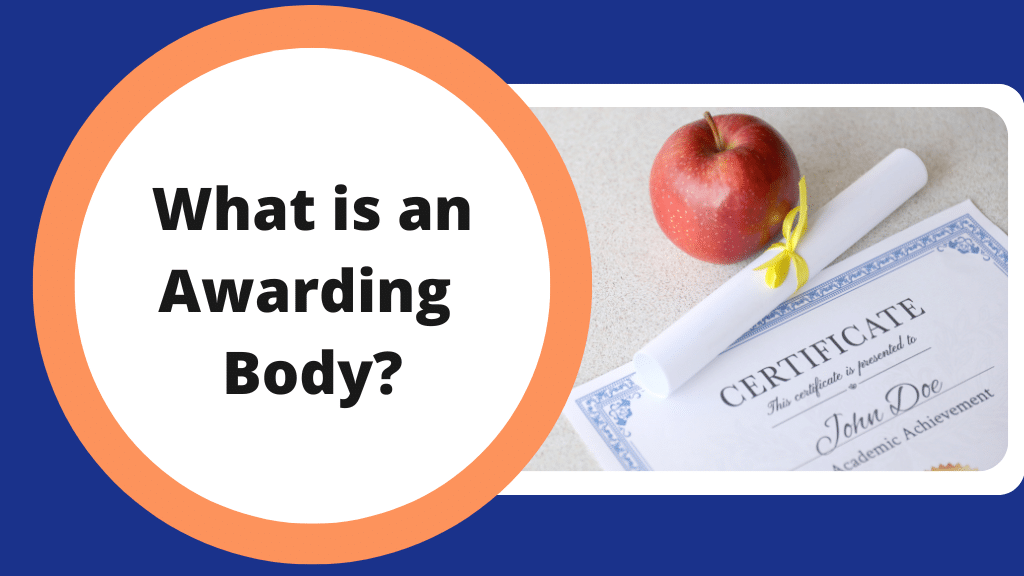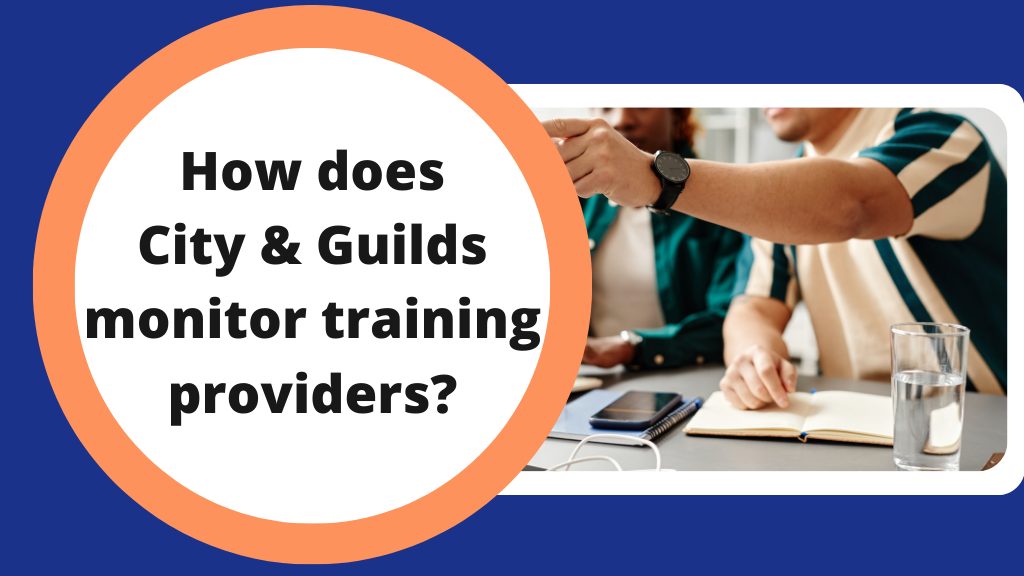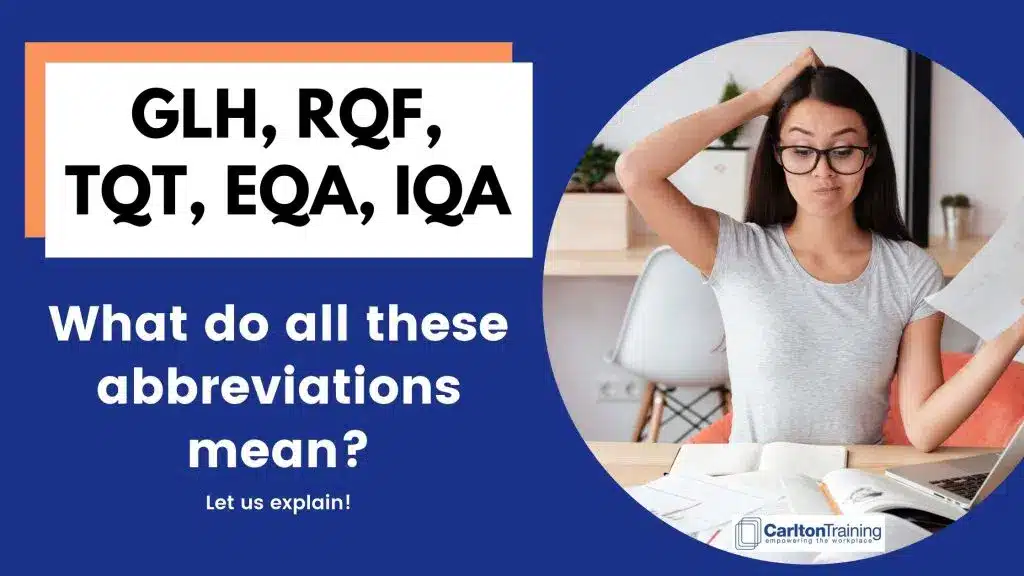August 15, 2025
What is an Awarding Body?

If you’re thinking about becoming an assessor or stepping into teaching and training, you’ll quickly come across the term awarding body. Every recognised qualification you’ll deliver or assess comes from one of these organisations – but what exactly are they, and why should they matter to you?
An awarding body is the organisation that creates and issues qualifications. They decide what knowledge and skills a learner must show, and they set the standards that assessors and educators work to. As well as all this, they’re the ones who issue the certificates to successful candidates.
What do awarding bodies do?
Awarding bodies have a wide-ranging responsibilities in shaping qualifications and keeping them credible:
Design Qualifications
Awarding bodies create the structure of qualifications, including the units, learning outcomes, and assessment criteria. These documents become your roadmap as an assessor or teacher to guide and assess your candidates.
Set Assessment Standards
They decide how learners’ knowledge and skills should be measured, so every candidate is judged fairly and consistently.
Approve Centres
Only approved centres such as training providers, colleges, or employers can deliver awarding body qualifications. This means if you work for one of these centres, you’re delivering for an organisation that has already been checked for quality.
Monitor Quality
Awarding bodies carry out external checks (known as External Quality Assurance) to make sure assessment decisions are accurate and that centres maintain the required standards as well as treat candidates fairly.
Why Awarding Bodies are Important for Learners
Awarding bodies make qualifications worthwhile. When someone completes a course approved by an awarding body, they receive a certificate that is recognised by employers, training providers, and professional bodies.
Because awarding bodies are regulated, learners can be confident that:
- Their achievement is portable – a qualification from City & Guilds, Pearson, NCFE, or any other recognised awarding body is valid across the UK and often internationally.
- Standards are consistent – no matter where they studied, the qualification represents the same level of knowledge and skill.
- Their progress opens doors – an awarding body certificate can lead directly into employment, higher education, or further professional training.
Why Awarding Bodies Matter for Assessors and Educators
If you’re starting out as an assessor or teacher, awarding bodies define the standards that shape your day-to-day work. Their qualification specifications guide how you design lessons, carry out assessments, and record learner progress. Your role is to measure achievement against these nationally recognised benchmarks, not personal opinion, which guarantees fairness and consistency for every learner.
By working to the awarding body requirements, you help protect both learners and centres, making sure the results are credible, no matter who delivers the assessment.
Because qualifications are regularly reviewed and updated, staying current with awarding body changes is also part of your professional responsibility and an important aspect of your continuing professional development (CPD).
Ofqual Recognised Awarding Bodies in the UK
In the UK, awarding bodies are regulated by Ofqual (the Office of Qualifications and Examinations Regulation), Qualifications Wales and SQA (Scottish Qualifications Authority). This means they must meet strict requirements to make sure their qualifications are reliable, consistent, and valued by employers and industries.
Some of the most widely recognised awarding bodies include City & Guilds, Pearson (Edexcel), NCFE, Cambridge OCR, ILM, and VTCT. Each has its own areas of specialism; for example, City & Guilds is known for its vocational and technical qualifications, while ILM focuses on leadership and management.
Alongside these big names, there are also many sector-specific awarding bodies covering industries like health and safety, construction, and beauty therapy.
How Awarding Bodies Work with Training Providers
Awarding bodies don’t deliver training directly themselves. Instead, they approve centres like colleges, independent training providers, or employer-based schemes to offer their qualifications. To gain approval, a centre must show it has the right staff, resources, and systems in place to deliver courses to the required standard.
Once approved, centres are monitored through ongoing checks. Awarding bodies send External Quality Assurers (EQAs) to review assessment decisions, sample learner work, and confirm that the centre is following the qualification specification correctly.
This process makes sure that learners receive the same standard of qualification, no matter where they study. For you as an assessor or educator, it highlights the importance of working to the awarding organisation’s requirements and keeping clear records so you can demonstrate compliance when centres are reviewed.
The Assessor’s Connection with Awarding Bodies
As an assessor, your work is directly shaped by the awarding body’s requirements. Every observation, discussion, or piece of learner evidence you sign off on must be judged against the standards set out in the qualification specification. This makes awarding bodies central to how you plan assessments, make decisions, and provide feedback.
Getting this right is crucial. If the wrong curriculum is followed for a particular awarding body, or if learners are mistakenly prepared against out-of-date standards, it can completely scupper their chances of success. You sometimes hear of these cases in the news, where learners have been disadvantaged simply because the centre or assessor was not working to the correct awarding body standards.
You’ll also be expected to record your assessment decisions clearly so they can be checked during internal and external quality assurance. This transparency protects learners and centres, and it helps awarding bodies confirm that qualifications are being delivered fairly.
Build Your Career in Education or Assessing with Recognised Qualifications
If you’re interested in beginning a career as an assessor or teacher, the first step is gaining qualifications that are approved by awarding bodies. This gives you the credibility and confidence to deliver learning and assessment to nationally recognised standards.
At Carlton Training, we provide a full range of qualifications to help you start or progress in education and assessment. From Level 3 Award in Education and Training, the Level 4 Award in Internal Quality Assurance to the Level 3 Certificate in Assessing Vocational Achievement (CAVA) for new assessors, all our programmes are designed to meet awarding body requirements and prepare you for a successful career.
Our courses will give you a strong grounding in the principles and best practices that underpin education and assessment. If you train as an assessor, you’ll learn how to plan effectively, carry out fair and consistent assessments, and provide constructive feedback in line with awarding body standards. If you’re preparing to be an educator, you’ll develop the skills to design engaging lessons, support diverse learners, and use assessment methods that track progress accurately. Whichever path you take, this knowledge becomes part of your professional toolkit, helping you feel confident in your role from day one.
Start your journey today. Explore our assessor and teaching courses and take the next step towards a rewarding career in education.
FAQs About Awarding Bodies
Are awarding bodies the same as training providers?
An awarding body (sometimes called an awarding organisation) is the organisation responsible for designing qualifications, setting the assessment criteria, and issuing certification.
Training providers, colleges, or employers deliver the course content and prepare learners for assessment. A provider must first gain approval from an awarding body to deliver a qualification. This separation makes sure that qualifications and certifications are consistent, high-quality, and widely recognised.
Who regulates awarding bodies in the UK?
Awarding bodies are regulated by national organisations that are responsible for maintaining the quality of education. In England, this regulator is Ofqual, which oversees qualifications within the Regulated Qualifications Framework (RQF).
In Wales, regulation is handled by Qualifications Wales, while CCEA covers Northern Ireland and SQA (Scottish Qualifications Authority) oversees qualifications in Scotland.
Each regulator sets conditions of recognition that awarding bodies must meet to ensure their qualifications remain credible.
Do all qualifications need an awarding body?
Not all training courses need to be approved by an awarding body, but they should be if you want a recognised qualification.
Awarding bodies are responsible for making sure that qualifications meet certain standards and form part of a wider qualifications framework, (eg. the RQF). This framework gives learners confidence that their achievements represent the right level of competence and that the qualification will gain recognition with employers and educational institutions.
What’s the difference between an awarding body and a professional body?
An awarding body is responsible for designing qualifications, maintaining assessment and quality assurance processes, and issuing nationally recognised certification.
A professional body represents people within a specific sector, often providing membership, charters, and professional development opportunities. While professional bodies may endorse or support qualifications, they are not usually the organisations that award them.
Next ›‹ Previous
Back to Blog








